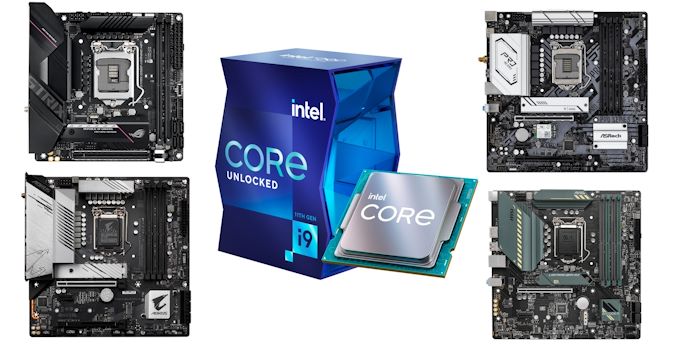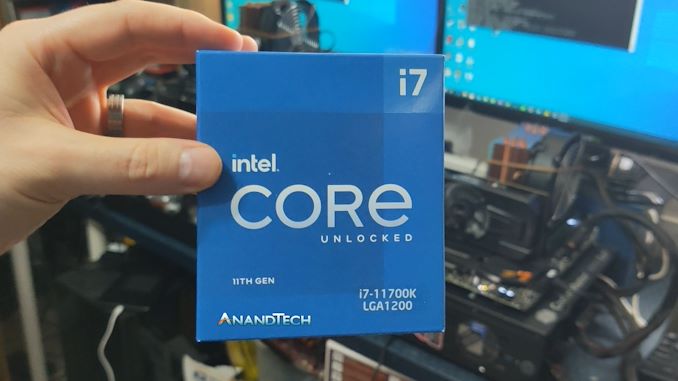Intel Rocket Lake (14nm) Review: Core i9-11900K, Core i7-11700K, and Core i5-11600K
by Dr. Ian Cutress on March 30, 2021 10:03 AM EST- Posted in
- CPUs
- Intel
- LGA1200
- 11th Gen
- Rocket Lake
- Z590
- B560
- Core i9-11900K
Conclusion
For anyone buying a new system today, the market is a little bleak. Anyone wanting a new GPU has to actively pay attention to stock levels, or drive to a local store for when a delivery arrives. The casual buyers then either look to pre-built systems (which are also flying off the shelves), or just hang on to what they have for another year.
But there is another way. I find that users fall in to two camps.
The first camp is the ‘upgrade everything at once’ attitude. These users sell their old systems and buy, mostly, all anew. Depending on budget and savings, this is probably a good/average system, and it means you get a good run of what’s available at that time. It’s a multi-year upgrade cycle where you might get something good for that generation, and hopefully everything is balanced.
The other camp is the ‘upgrade one piece at a time’. This means that if it’s time to upgrade a storage drive, or a memory kit, or a GPU, or a CPU, you get the best you can afford at that time. So you might end up with an older CPU but a top end GPU, good storage, good power supply, and then next time around, it’s all about CPU and motherboard upgrades. This attitude has the potential for more bottlenecks, but it means you often get the best of a generation, and each piece holds its resale value more.
In a time where we have limited GPUs available, I can very much see users going all out on the CPU/memory side of the equation, perhaps spending a bit extra on the CPU, while they wait for the graphics market to come back into play. After all, who really wants to pay $1300 for an RTX 3070 right now?
Performance and Analysis
In our Core i7-11700K review, our conclusions there are very much broadly applicable here. Intel’s Rocket Lake as a backported processor design has worked, but has critical issues with efficiency and peak power draw. Compared to the previous generation, clock-for-clock performance gains for math workloads are 16-22% or 6-18% for other workloads, however the loss of two cores really does restrict how much of a halo product it can be in light of what AMD is offering.
Rocket Lake makes good in offering PCIe 4.0, and enabling new features like Gear ratios for the memory controller, as well as pushing for more support for 2.5 gigabit Ethernet, however it becomes a tough sell. At the time we reviewed the Core i7-11700K, we didn’t know the pricing, and it was looking like AMD’s stock levels were pretty bad, subsequently making Intel the default choice. Since then, Intel's pricing hasn't turned out too bad for its performance compared to AMD (except for the Core i9), however AMD’s stock is a lot more bountiful.
For anyone looking at the financials for Intel, the new processor is 25% bigger than before, but not being sold for as big a margin as you might expect. In some discussions in the industry, it looks like retailers are getting roughly 20%/80% stock for Core i9 to Core i7, indicating that Intel is going to be very focused on that Core i7 market around $400-$450. In that space, AMD and Intel both have well-performing products, however AMD gets an overall small lead and is much more efficient.
However, with the GPU market being so terrible, users could jump an extra $100 and get 50% more AMD cores. When AMD is in stock, Intel’s Rocket Lake is more about the platform than the processor. If I said that that the Rocket Lake LGA1200 platform had no upgrade potential, for users buying in today, an obvious response might be that neither does AM4, and you’d be correct. However, for any user buying a Core i7-11700K on an LGA1200 today, compared to a Ryzen 7 5800X customer on AM4, the latter still has the opportunity to go to 16 cores if needed. Rocket Lake comes across with a lot of dead-ends in that regard, especially as the next generation is meant to be on a new socket, and with supposedly new memory.
Rocket Lake: Failed Experiment, or Good Attempt?
For Intel, Rocket Lake is a dual purpose design. On the one hand, it provides Intel with something to put into its desktop processor roadmap while the manufacturing side of the business is still getting sorted. On the other hand it gives Intel a good marker in the sand for what it means to backport a processor.
Rocket Lake, in the context of backporting, has been a ‘good attempt’ – good enough to at least launch into the market. It does offer performance gains in several key areas, and does bring AVX-512 to the consumer market, albeit at the expense of power. However in a lot of use cases that people are enabling today, which aren’t AVX-512 enabled, there’s more performance to be had with older processors, or the competition. Rocket Lake also gets you PCIe 4.0, however users might feel that is a small add-in when AMD has PCIe 4.0, lower power, and better general performance for the same price.
Intel’s future is going to be full of processor cores built for multiple process nodes. What makes Rocket Lake different is that when the core was designed for 10nm, it was solely designed for 10nm, and no thought was ever given to a 14nm version. The results in this review show that this sort of backporting doesn’t really work, not to the same level of die size, performance, and profit margin needed to move forward. It was a laudable experiment, but in the future, Intel will need to co-design with multiple process nodes in mind.












279 Comments
View All Comments
Qasar - Friday, April 2, 2021 - link
no but i am sure you are as YOU are the one that keeps moving the goal posts, not me. YOU said PC gaming was an expensive hobby, so i suggested a console, so you can save money vs a comp, as this seems to be you WHOLE POINT, to save money." I also never said use the iGPU to game, because gaming on a iGPU, basic dGPU, or APU will be a crappy experience on modern titles. " no but you INSINUATED that you did, so who is the idiot ? and to go buy a 11600k and NOT use it for gaming, as YOU IMPLIED, (cause if you are not going to game with and need the cores, the 5600X is clearly the better choice, as its multi threaded performance, is above the 11600k) is well, whats that word you keep crying about, oh yea, E waste. if that is the case and you dont intend on gaming then getting a MUCH cheaper cpu, with your beloved igp, would be a better option.
as i said in my other post, as you are now resorting to name calling, is further shows, you are wrong, and your whole point, has been proved wrong by giving other options, so, run along little child, when you can talk with out resorting to name calling, then come back
vanish1 - Monday, April 5, 2021 - link
please stop, you keep being wrong.why would anyone buy a console if they intend to build a PC or PC game? Do you understand what saving money means? It means not spending it.
Once again, I never said gaming on a PC, I said build a PC. You keep assuming incorrectly. As such, see original post.
1_rick - Tuesday, March 30, 2021 - link
Ridiculous. Bottom-tier dGPUs are $50-60, even on Newegg. Sure, they're worthless for gaming, but they'll be fine for office work and basic web browsing.vanish1 - Wednesday, March 31, 2021 - link
Okay so spend $60 on overpriced E-waste that you will have to eventually replace anyways when that money could have been put into a higher tier CPU, saved towards your actual GPU, or spent on other parts of the PC build.Who wants to spend $60 on a GPU just to make their CPU work? Its ridiculous.
Qasar - Wednesday, March 31, 2021 - link
who says you have to throw it out ? you COULD keep it for emergencies, put it in another comp, or, um i dunno, sell/give it to a friend who could use a vid card for what ever reason.you say intel is the only option/best option, but you obviously havent considered anything thing else.
vanish1 - Wednesday, March 31, 2021 - link
The fanboys that exist here crack me up. Constant complaining about the GPU market, overpriced and out of stock, yet willing to add fuel to that fire just to have an AMD CPU grace your presence; the hypocrisy is outstanding. I never said throw it out, it just ends up being E-waste at the end, but your mindset is the issue with the disposable culture we live in. Beyond that, I dont want to go through the hassle of buying and selling multiple cards, Ill buy one when its time, plug it into my system, and be done. Put it into another computer? So build another computer on top of the one youre already building, not alot of sense there. Give it to a friend, why would you waste your friends time with a 710 gt? Sounds more like trying to pass the buck.29a - Wednesday, March 31, 2021 - link
Did you really just call other people fanboys?Qasar - Wednesday, March 31, 2021 - link
thats what i thought, looks like there is a new intel fanboy on here :-) maybe he is upset cause rocket lake is well, pathetic ( going by GN's review )vanish1 - Thursday, April 1, 2021 - link
I mean when people like yourself and 29a cant comment on the point I'm making and instead try to dunk on me for calling out Intel shills when I see them, it clearly shows who is right (me) and who is wrong (both of you)BushLin - Thursday, April 1, 2021 - link
Your argument is to PC gaming enthusiasts that they should enjoy the performance they had in their gaming rig over a decade ago but on modern titles because there is a GPU shortage. If you truly cared about ewaste, why not just continue using your old rig rather than buy a dead end motherboard to have a worse experience?